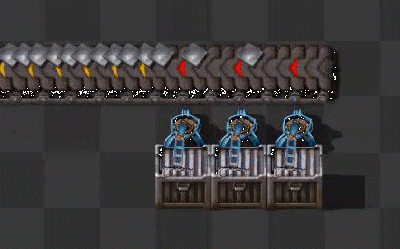Transport belt: Difference between revisions
New navigation organization |
No edit summary |
||
| Line 8: | Line 8: | ||
|- | |- | ||
! scope="col" | Type | ! scope="col" | Type | ||
! scope="col" | Max. throughput ([[Items]] per [[game-second]]) | ! scope="col" | Max. throughput ([[Items]] per [[game-second]])* | ||
! scope="col" | Speed ([[Tile|Tiles]] per [[game-second]]) | ! scope="col" | Speed ([[Tile|Tiles]] per [[game-second]])* | ||
! scope="col" | Max. density ([[Items]] per [[Tile|tile]]) | ! scope="col" | Max. density ([[Items]] per [[Tile|tile]])* | ||
! scope="col" | Required [[Research|technologies]] | ! scope="col" | Required [[Research|technologies]] | ||
|- | |- | ||
| {{imagelink|basic-transport-belt|Basic transport belt}} || 13. | | {{imagelink|basic-transport-belt|Basic transport belt}} || 13.33 || 1.875 || 7.111 || none | ||
|} | |} | ||
* | *See '''[[Transport_belts/Physics|Physics of Transport Belts]]''' for more detailed information. | ||
[[File:Basic_transport_belt_fulldensity.gif|right|400px|thumb|3 [[fast inserter]]s per side will fill a basic transport belt to maximum density.]] | [[File:Basic_transport_belt_fulldensity.gif|right|400px|thumb|3 [[fast inserter]]s per side will fill a basic transport belt to maximum density.]] | ||
Revision as of 22:37, 21 December 2016
Transport belt/infobox The Basic Transport Belt is the easiest and cheapest method of automatic item transportation. It is available from the beginning of the game, without any research. See Belt transport system for more general information about transport belts.
Properties
| Type | Max. throughput (Items per game-second)* | Speed (Tiles per game-second)* | Max. density (Items per tile)* | Required technologies |
|---|---|---|---|---|
| Basic transport belt | 13.33 | 1.875 | 7.111 | none |
*See Physics of Transport Belts for more detailed information.

Stepping on a transport belt will convey the player in the direction of the transport belt, at a somewhat slow speed. The player can fight the movement, or run with it to speed up. This can be used for transportation over short distances faster than running.
Production Layouts
Iron gear wheels take the same amount of time to manufacture as transport belts, so one gear assembler can supply one belt assembler at full capacity, provided they are the same tier. An example is below.
| Design | Input: (Items per game-second) |
|---|---|
| File:Transport belt layout1.jpg | |
| Output: (Items per game-second) | |
History
- 0.13.0:
- Transport belt is now connectible to the circuit network.
- Transport belt connectible entities will now disconnect from incoming belts when marked for deconstruction.
- 0.12.0:
- Items on transport belts don't go off the belt at the end, so the transport belt has to go directly in front of the required inserter.
- Optimised the transport belt movement.
- 0.11.9:
- Items marked for deconstruction cannot be moved by belts anymore.
- Reduced the CPU load caused by big counts of inserters loading/unloading transport belts.
- 0.11.0:
- Fast/express belts are now made from the slower variants.
- 0.9.7:
- Belts to be deconstructed no longer accept items.
- 0.9.6:
- New transport belt graphics.
- 0.9.0:
- Small optimisation.
- 0.7.1:
- Express transport belt now takes 15 Iron gear wheels to craft.
- 0.6.0:
- Transport belt doesn't pull player out of the edge of it (like items), so player won't be almost trapped on faster transport belts.
- 0.5.0:
- Better movement on transport belts in turns and crossings.
- 0.2.8:
- Cross connections of transport belt of the same type are disabled.
- 0.2.2:
- When transport belts are rotated (or replaced with different than opposite direction), items on transport belt are collected.
- 0.2.1:
- Small optimisation.
- 0.1.0:
- Introduced